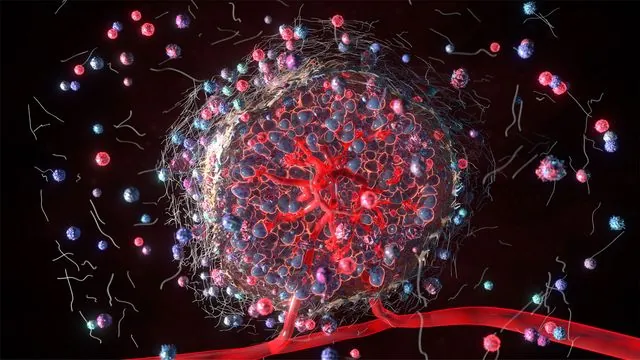
Unlocking the Secrets of the Tumor Microenvironment: How Metabolism Fuels Cancer
2025-04-26
Author: Wei Ling
The Tumor Microenvironment: A Battle Ground of Survival
Imagine a world where survival is a constant struggle against deprivation—this is the harsh reality of the tumor microenvironment (TME). Here, cancer cells are faced with severe nutrient shortages, low oxygen levels, and unfavorable pH, compelling them to drastically alter their metabolism. To thrive in this hostile setting, cancer cells ramp up their consumption of glucose and amino acids, laying the groundwork for relentless tumor growth and progression.
Metabolic Strains: The Hidden Challenges in Tumor Growth
Solid tumors often grapple with dismal blood supply, limiting essential nutrients like glucose and oxygen. This scarcity isn't just a minor inconvenience; it creates a state of nutrient stress that directly influences how tumors develop. In response, cancer cells adapt their movement and invasiveness, leading to heightened metastasis.
To shield themselves from further harm, cancer cells may enhance protective metabolic pathways. For instance, they can boost the activity of nuclear factor erythroid 2-related factor 2 (Nrf2), a protein that helps fend off oxidative stress. This process reduces cell death while promoting the aggressive traits of the tumor.
A Double-Edged Sword: Impact on Immune Cells
As Dr. Alexander Muir from the University of Chicago highlights, nutrient scarcity doesn’t just affect cancer cells; it also poses significant challenges to anti-tumor immune cells. The TME's limited resources can suppress immune cell functions, hampering their ability to eliminate cancer cells effectively.
Interestingly, this nutrient deficit can simultaneously empower regulatory immune cells, enhancing the cancer cells’ ability to escape immune detection.
Exploiting Nutrient Stress: A New Frontier in Treatment?
This nutrient scramble presents a golden opportunity for targeted therapy. Unlike normal cells, cancer cells rely on unique adaptations to survive nutrient-poor environments. By pinpointing these vulnerabilities, researchers could potentially develop drugs that effectively starve cancer cells without harming healthy tissue. "The nutrient challenges in the TME could unveil a new arsenal of therapeutic targets," suggests Muir.
The Fight for Resources: Cancer Cells vs. T Cells
In the TME, cancer cells and immune cells exist in close quarters, sparking intense competition for vital nutrients. Both cell types heavily depend on glucose, and when cancer cells overpower immune cells in this race, they render the latter ineffective. Additionally, cancer cells can secrete enzymes that deplete tryptophan, inhibiting T cell proliferation.
Compounding the problem, the metabolic by-products from cancer cells—like lactate—can disrupt T cell function, making it increasingly difficult for the immune system to mount a successful attack on tumors. Muir emphasizes that understanding this competition is critical for improving immunotherapy outcomes.
Future Directions: The Path Forward in Cancer Metabolism Research
The field of cancer metabolism is on the brink of a revolution thanks to advancements in analytical techniques. State-of-the-art methods like nuclear magnetic resonance (NMR) spectroscopy and mass spectrometry are enabling researchers to analyze the myriad of metabolites and nutrients circulating within tumors.
Moreover, new technologies in spatial metabolomics will greatly enhance our comprehension of tumor ecosystems, much like earlier breakthroughs in protein and RNA analysis have done.
Nevertheless, a significant challenge remains: understanding how diet influences cancer metabolism. Given the myriad of dietary patterns that contribute to cancer risk, researchers are striving to untangle this complex relationship, recognizing that diet affects not just nutrient availability but also hormonal balance and immune efficiency.
In conclusion, the intricate dance of metabolism within the TME poses both hurdles and opportunities in the fight against cancer. By decoding these metabolic mechanisms, we may uncover innovative strategies to redefine cancer treatment.

 Brasil (PT)
Brasil (PT)
 Canada (EN)
Canada (EN)
 Chile (ES)
Chile (ES)
 Česko (CS)
Česko (CS)
 대한민국 (KO)
대한민국 (KO)
 España (ES)
España (ES)
 France (FR)
France (FR)
 Hong Kong (EN)
Hong Kong (EN)
 Italia (IT)
Italia (IT)
 日本 (JA)
日本 (JA)
 Magyarország (HU)
Magyarország (HU)
 Norge (NO)
Norge (NO)
 Polska (PL)
Polska (PL)
 Schweiz (DE)
Schweiz (DE)
 Singapore (EN)
Singapore (EN)
 Sverige (SV)
Sverige (SV)
 Suomi (FI)
Suomi (FI)
 Türkiye (TR)
Türkiye (TR)
 الإمارات العربية المتحدة (AR)
الإمارات العربية المتحدة (AR)